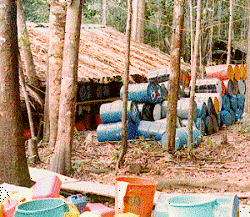Medellín Cartel
The Medellín Cartel was a powerful and highly organized Colombian drug cartel originating in the city of Medellín. The cartel was founded by Pablo Escobar, Carlos Lehder, George Jung, and José Gonzalo Rodríguez Gacha in the early 1970s. It operated throughout the 1970s and 1980s, primarily engaging in drug trafficking, money laundering, and murder.
History[edit | edit source]
The Medellín Cartel was established in 1972 by a group of Colombian criminals who sought to dominate the cocaine trade. The cartel quickly grew in power and influence, becoming one of the most feared and wealthy criminal organizations in the world.
Founders[edit | edit source]
- Pablo Escobar: Often referred to as the "King of Cocaine," Escobar was the most notorious member of the cartel. He was responsible for the majority of the cartel's operations and was known for his ruthless tactics.
- Carlos Lehder: Lehder was instrumental in establishing the cartel's drug trafficking routes, particularly through the Bahamas.
- George Jung: An American drug trafficker who played a key role in the cartel's operations in the United States.
- José Gonzalo Rodríguez Gacha: Known as "El Mexicano," he was responsible for the cartel's military operations and security.
Operations[edit | edit source]
The Medellín Cartel controlled a significant portion of the world's cocaine supply during its peak. The cartel's operations extended to various countries, including the United States, Mexico, Spain, and Canada. The cartel utilized a combination of bribery, violence, and intimidation to maintain its dominance.
Downfall[edit | edit source]
The cartel's downfall began in the late 1980s and early 1990s due to increased pressure from the Colombian National Police, the United States Drug Enforcement Administration, and rival criminal organizations such as the Cali Cartel and Los Pepes. The death of Pablo Escobar in 1993 marked the end of the Medellín Cartel's reign.
Legacy[edit | edit source]
The Medellín Cartel left a lasting impact on Colombia and the global drug trade. The cartel's activities led to widespread violence and corruption in Colombia, and its legacy continues to influence the country's politics and society.
Related Pages[edit | edit source]
- Pablo Escobar
- Carlos Lehder
- George Jung
- José Gonzalo Rodríguez Gacha
- Cali Cartel
- Los Pepes
- Colombian National Police
- United States Drug Enforcement Administration
Template:Organized crime groups
Search WikiMD
Ad.Tired of being Overweight? Try W8MD's physician weight loss program.
Semaglutide (Ozempic / Wegovy and Tirzepatide (Mounjaro / Zepbound) available.
Advertise on WikiMD
|
WikiMD's Wellness Encyclopedia |
| Let Food Be Thy Medicine Medicine Thy Food - Hippocrates |
Translate this page: - East Asian
中文,
日本,
한국어,
South Asian
हिन्दी,
தமிழ்,
తెలుగు,
Urdu,
ಕನ್ನಡ,
Southeast Asian
Indonesian,
Vietnamese,
Thai,
မြန်မာဘာသာ,
বাংলা
European
español,
Deutsch,
français,
Greek,
português do Brasil,
polski,
română,
русский,
Nederlands,
norsk,
svenska,
suomi,
Italian
Middle Eastern & African
عربى,
Turkish,
Persian,
Hebrew,
Afrikaans,
isiZulu,
Kiswahili,
Other
Bulgarian,
Hungarian,
Czech,
Swedish,
മലയാളം,
मराठी,
ਪੰਜਾਬੀ,
ગુજરાતી,
Portuguese,
Ukrainian
Medical Disclaimer: WikiMD is not a substitute for professional medical advice. The information on WikiMD is provided as an information resource only, may be incorrect, outdated or misleading, and is not to be used or relied on for any diagnostic or treatment purposes. Please consult your health care provider before making any healthcare decisions or for guidance about a specific medical condition. WikiMD expressly disclaims responsibility, and shall have no liability, for any damages, loss, injury, or liability whatsoever suffered as a result of your reliance on the information contained in this site. By visiting this site you agree to the foregoing terms and conditions, which may from time to time be changed or supplemented by WikiMD. If you do not agree to the foregoing terms and conditions, you should not enter or use this site. See full disclaimer.
Credits:Most images are courtesy of Wikimedia commons, and templates, categories Wikipedia, licensed under CC BY SA or similar.
Contributors: Prab R. Tumpati, MD







